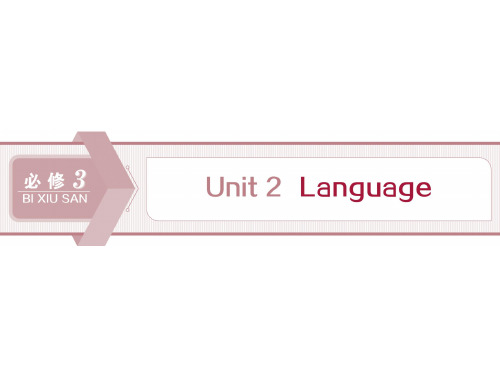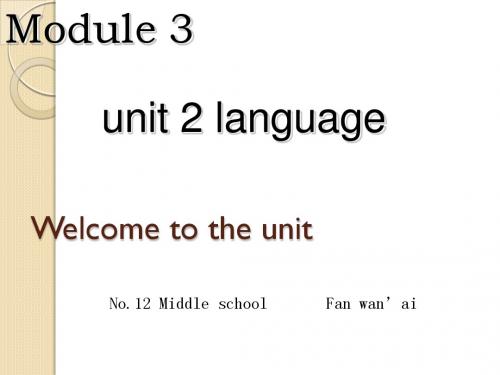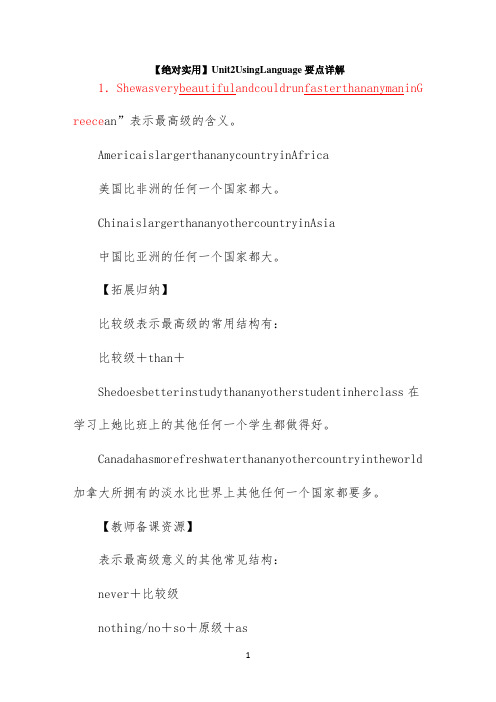Unit2Language.it的用法(知识梳理)(20200509141701)
Unit 2 知识点提要

8A Unit 2 知识点提要一、词汇1.广告可n. advertisement ▲(an/-s)2.英国的adj. British3.美国的adj. American4.饼干可n. <英> biscuit (a/-s)、<美> cookie (a/-s)5.卡车可n. <英>*lorry ▲(a/lorries)、<美> truck (a/-s)6.橡皮可n. <英> rubber (a/-s)、<美>eraser ▲(an/-s)7.足球可n. <英> football (a/-s)、<美> *soccer (a/-s)8.假期可n. <英> holiday (a/-s)、<美> vacation (a/-s)9.秋天可n. <英> autumn (a/-s)、<美> fall (a/-s)下落;跌倒;倒塌↓v. fall→三单:-s →▲过去式:fell →▲现分:-ing10.商店可n. <英> shop (a/-s)、<美> store (a/-s)11.院子可n. <英> garden (a/-s)、<美> y ard (a/-s)12.电影可n. <英> film (a/-s)、<美> movie (a/-s)[典型例题]( ) 1. People in the UK say biscuit while people in the USA say ______.A. cakeB.cookieC.eraserD.soccer( ) 2. Which sentence is likely (可能) to be spoken by Americans?A. David Beckham is a popular soccer star.B. The shop sells different kinds of biscuits.C. It doesn’t rain often in this city in autumn.D. The film is very popular.( ) 3. If you are an Englishman, you may say “__________ ”A.I want some cookies.B. Autumn is coming.C. Can I borrow your eraser?D. He often plays soccer with his friends.13.男女混合的,混合的adj. *mixed★一所混合学校a mixed school混合v.8AU4mix →▲三单:-es →过去式:-ed →现分:-ing把A与B混合mix A with B把...混合在一起8AU4mix ... together14.法语不可n. &法国人可n.(a/-s) &法国(人)的adj.8BU4French法国可n. France (a/-s) 常用单数15.外国的adj. foreign (not in or from your own country)外国人可n. foreigner (a/-s)16.语言可n. language (a/-s) (words used in speaking and writing)区分:青少年可n. *teenager (a/-s)17.在…期间prep. during18.讨论,议论v. discuss (talk about something)→▲三单:-es →过去式:-ed →现分:-ing★与某人讨论某事discuss sth. with sb.讨论可n.8BU5 discussion (a/-s)19.在课堂上(短语)in class20.<口>家伙可n. *guy (a/-s)21.<口>好朋友;搭档可n.*buddy ▲(a/buddies)22.主动提出,自愿给予v. offer (give something to someone)→三单:-s →过去式:-ed →现分:-ing★为某人提供某物(2种)offer sth. to sb.= offer sb. sth.★给某人某物(2种)give sth. to sb.= give sb. sth.23.结束v. end →三单:-s →过去式:-ed →现分:-ing终止;末尾;终点可n.7BU8end (a/-s)24.棒球可n. baseball (a/-s)25.赢得;赢,获胜v. win (be best or first in a competition)→三单:-s →▲过去式:won →▲现分:winning获胜者可n. winner (a/-s)26.最少的;最小的adj. (little的最高级) least27.至少,不少于(短语)at least28.至多,不超过(短语)at most29.较远(的)/更远(的) adj.&adv. (far的比较级) farther/further★further常考固搭(5种)进一步学习/研究further study/ research 进一步讨论further discussion更多的信息further information 其他的问题further questions再往前/下走8BU3further on/ down30.最远(的) adj.&adv. (far的最高级) farthest/furthest31.花费(时间或金钱) v. spend →三单:-s →▲过去式:spent →现分:-ing★★★★★“花费”公式(4种)It/事takes/took sb. 时间段to do sth.人spend(s)/spent时间段/金钱on sth.(in) doing sth.人pay(s)/paid(金钱)for sth.物cost(s)/cost sb. 金钱(A.takes; spendsB. takes; costsC. costs; costsD. spends; takes( )2. [基础题]The trip to the zoo _______ us about one hour by underground yesterday.A. paidB. tookC. spentD. cost( )3. [易错题]This dress is too expensive, it ____ me 2000 yuan.A.takesB. spendsC. paysD. costs( )4. [难题]He tries to spend as much time as he can ____ computer games.A. playB. playsC. playingD.to play32.制服可n. *uniform ★(a/-s)穿校服wear a school uniform= wear school uniforms33.国际象棋不可n. chess34.每日的,日常的adj.&日报n. daily35.每周的adj. weekly36.快的adj. quick 比较级:-er 最高级:the -est快地adv. quickly比较级:more ~ 最高级:the most ~慢的adj. slow 比较级:-er 最高级:the -est慢地adv. slowly比较级:more ~ 最高级:the most ~37.自始至终,从头到尾&(内部)穿过7BU6 prep. th r ough区分:though/although prep. 尽管thought v. 认为(think的过去式)38.浏览,快速查看(短语)look through39.真实的,真的adj. real真实地;确实,的确adv. really40.起初,首先(短语)at first41.继续/重复做某事(短语)keep (on) doing sth.[拓展] “继续做某事”(4种)keep (on) doing sth.= continue doing sth.= carry on doing sth. = carry on with sth.42.完成;结束v. finish →▲三单:-es →过去式:-ed →现分:-ing★完成做某事finish doing sth.43.午餐时间不可n. lunchtime★在午餐时间at lunchtime44.物理(学) 不可n. physicsPhysics _______ (be) a useful subject, the student must learn it wisely and well.45.羽毛球运动不可n. *badminton[总结] ★★★常考冠词题play+球类、棋、牌、中国乐器 e.g. play baseball/badminton/chess/cards/erhu(二胡) play the+西洋乐器 e.g. play the piano/violin/guitar/drums(鼓)46.理想的adj. *ideal★一所理想的学校an ideal school区分:想法,主意,思想可n. idea▲(an/-s)二、语言点1.(某人)为什么不做某事Why don’t/doesn’t/didn’t sb do sth. =why not do sth.2.like作动词意为“喜欢”,作介词意为“像”(无时态、人称、数的变化)be like 像;look like 看起来像像做某事be like doing sth.—What is your school life like?—It is like _______ (live) in a big garden.( ). Tom, _____ his brother, _____ playing basketball after school.A.like; likesB. like; likeC. likes; likesD. likes; like3.little “几乎没有”,修饰不可n. a little “有一些”,修饰不可n.few “几乎没有”,修饰可n.复 a few“有一些”,修饰可n.复4.你想要做某事吗?Would you like to do sth. ?肯定回答:Yes, I’d like/love to. 否定回答:I’d like/love to, but……5.做某事玩得开心have a good/great/nice/lovely/wonderful/fantastic time doing sth.有很多much/lots of/a lot of没有have no有更多时间做某事more time to do sth.有更少less有一段some time[典型例题]( )1. —Hey, guys. Do you often have a good time _____ after-school activities?—Of course, we do. And we always have a lot of time_____ soccer.A. to do; to practiseB. doing; to practiseC. to do; practisingD. doing; practising( )2.Amy had a lovely time ____ one place after another in Shanghai and she had much time _____ the city.A. to visit; to enjoyB. visiting; to enjoyC. to visit; enjoyingD. visiting; enjoying( )3.Linda had a great time ____ with her friends, and they also had some time ____ about their studies last weekend.A.to talk; to talkB. to talk; talkingC. talking; to talkD. talking; talking6.练习做某事practice doing sth.( )1. My brother enjoys __________ the piano in the music room.A.practice playingB. practice playC. practicing playingD. practice to play( )2. The two girls always have a good time ________ the piano together.A.practice to play B.to practice to play C.to practice playing D.practicing playing( )3. [难题]We should spend as much time as we can __________ English every day.A. practice speakingB. practice to speakC. on practicing speakingD. practicing speaking7.给某人买某物buy sth. for sb.= buy sb. sth.8.在几年级(2种)in Year/Grade+基数词= in the+序数词+year/gradee.g. 在八年级______________________= ______________________(思考:如果改用阿拉伯数字呢?)9.单个动名词作主语,谓语动词用单数As we all know, using public chopsticks ________ (be) necessary when we eat with others.10.“借”(3种)borrow/borrowed 借入borrow sth. from sb.从某人那借来某物lend/lent 借出lend sth. to sb.= lend sb. sth.把某物借给某人keep/kept 借用keep sth. for+时间段借用某物一段时间How long提问①(for)+时间段①since +时间点①since 从句How soon提问in +时间段How far提问路程①实际距离 e.g.500 metres①s’ walk/ ride /drive /flight(航行) /bus ride /car ride/ train ride①时间段+交通方式e.g. 15 minutes by bus How often提问频率①次数+a+时间单位 e.g. twice a week①every+时间单位 e.g. every day③频度副词7个:always总是、usually通常、often经常、sometimes有时、seldom很少、hardly几乎不、never从不( )1—How far is it from your home to your school? —________.A.On foot B.I can take a bus there C.It’s about half an hour D.About ten minutes’ walk( )2.— How long have you had the bike? — ______ two years. A.in B.until C.since D.for ( )3.— How soon will these waste bottles be recycled?—_________. I have called the recycling company. A.For an hour B.An hour ago C.After an hour D.In an hour( )4.—_________ do you go to the concert? — Always, because I’m interested in it.A.How longB. How soonC. How oftenD. How far( )5. —________ is it from here to your home town? — Well, it takes over three hours to get there by coach. A. How soon B. How much C. How long D. How far( )6.—________do you have after-school activities? —Twice a week.A.How long B.How far C.How often D.How soon( )7. [易错题]—________ do you hear from your parents a week? —At least twice a week.A. How many timesB. How soonC. How oftenD. How long12.一篇由一个美国男孩写的文章an article (written) by a boy from the USA13.the number of…“…的数量”作主语,谓V.用单数;a number of…“许多”作主语,谓V.用复数( ). —A number of volunteers ________ willing to teach in China’s rural areas(农村地区).—Yes, the number of them _______ getting ________.A. is; are; more and moreB. are; is; larger and largerC. is; is; bigger and biggerD. is; are; more and more14.提问数量的句型(2种)What’s the number of the students in your class?=How many students are there in your class?15.seem“似乎”用法(3种)①seem (to be)+adj. ②seem to do sth. ③It seems that+从句16.[难点]need作动词的2种用法若need是情态动词,need do sth. ; 若need是实义动词,need to do sth.解题关键:如何判断need是情态动词还是实义动词?法一:看三单__________________ 法二:看否定__________________ 法三:看提问__________________ ( )1. Millie ______ her homework at the moment.A. needs not finishB. doesn’t need finishC. need not to finishD. doesn’t need to finish( )2. You needn’t ______ those things if you ______ them.A.buy; needn’tB.to buy; don’t needC.buy; don’t needD.to buy; needn’t( )3. —Does he need ______ there at once ? —No, he ______ leave so hurriedly because he has enough time.A. to go; needB. go; needn’tC. to go; needn’tD.go; doesn’t need17.代词it/one(s)的区分:it同类且同物、one(s)同类不同物( ). —The black dress doesn’t look nice on me. I don’t like _____ at all. —How about the blue _____?A.one; one B.it; one C.it; it D.one; it18.Each of(√);every of(×)19.Each of us ________(have) a book. We each ________(have) a book.20.有一个星期的假期have a week off21.★对每科进行一次月考have a monthly test on each subject22.我的日常生活my daily life23.有很多时间参加课外活动have lots of time for after-school activities24.★有一小时的家庭作业have an hour of homework25.★进行一次学校旅行(2种)go on/for a school trip26.★停止做某事(同一件事)stop doing sth. 停下来去做某事(另一件事)stop to do sth. ( )1. We have worked so long. Let’s stop ______ a rest.A.have B.to having C.having D.to have( )2.My father told me a funny joke and I can’t stop ________ every time I think of it.A.to laugh B.laughing C.from laughing D.Laughmore+可n.复/不可n.+than 比…多less+不可n.+than 比…少fewer+可n.复+than 比…少the most+可n.复/不可n.最多the least+不可n.最少the fewest+可n.复最少。
Unit2Theuniversallanguage省略句(知识梳理)

Unit 2 The universal language省略句概念引入省略的使用主要在于避免重复,可以使语言简洁、紧凑、重点突出、表达有力。
省略的原则是不损害结构或引起歧义。
所以我们要认真学习有关“省略”的常见规则,以便正确应用英语,另外,考查省略的题在高考题中也经常出现。
我们先看看这些句子:1. If (it is) possible, discuss what kind of first aid you should give in these situations.2. Often the illness or injury is not serious, but there are other times when (the illness orinjury is serious and) giving first aid quickly can save lives.3. These affect both the top (layer of the skin) and the second layer of the skin.4. Burns are called first (degree burns), second (degree burns) or third degree burns,depending on which layers of the skin are burned.5. He wanted to help the accident victim but his friend didn’t (want to help the accidentvictim).6. To her teacher’s surprise, she did better in her first aid exam than (she was) expected (todo).括号内为省略部分,把省略部分遮住,再次观察句子,思考:是不是什么都能省略呢?究竟可以省略那些词句呢?省略有什么规律吗?用法讲解功能词的省略:1. 冠词的省略1)两个并列名词都有同一冠词,第二个名词的冠词常可省略。
2020版江苏高考英语一轮必修3 Unit 2 Language

7.grasp v. 8.beneficial adj. 9.practise v. 10.official adj. 11.expression n. 12.vocabulary n.
第一部分 必修3 Unit 2
掌握 有益的 练习 官方的;正式的 词语;表达 词汇
栏目 导引
第一部分 必修3 Unit 2
栏目 导引
第一部分 必修3 Unit 2
5.defeat vt. 6.press vt. n. 7.mistaken adj. 8.simplify vt.
___击__败__,__战__胜_______________________ ___(_被__)_压__,__挤__,__推__,__施__加__压__力_________ ___报__刊__;__新__闻__界__;__出__版__社_____________ ___错__误__的__;__误__解__的___________________ ___简__化_____________________________
suitable for you?
I’m looking forward to your early reply.
Yours,
Li Hua
栏目 导引
第一部分 必修3 Unit 2
1.nowadays adv. 2.unique adj. 3.character n. 4.interrupt vi.& vt.
栏目 导引
第一部分 必修3 Unit 2
假定你是李华,你的英国笔友 David 寒假期间想来你所在的 城市学习汉语,让你帮他选择培训学校。请用英语给他写一封电 子邮件,推荐一所理想的培训学校,并告知他学习时间、课程内 容、食宿、交通及学费等情况。
Unit 2 Section Ⅱ Using language

Section ⅡUsing language1.worthwhile adj.重要的;值得做的(1)It's worthwhile doing/to do sth.值得做某事(2)be worth+n.值得……;值……be worth doing某事值得被做be worth it……是值得的(3)be worthy of+n.值得……be worthy of being done某事值得被做be worthy to be done某事值得被做这本参考书值得买,因为它对你的学习很有帮助。
①The reference book _______________,because it is of great help to your study.(worth)②The reference book ________________________________________because it is of great help to your study.(worthy)③______________________________ the reference book,because it is of great help to your study.(worthwhile)2.upset adj.心烦意乱的;烦恼的;不安的;不适的v t.使不安;使心烦;打翻(1)be upset about/over/at sth. 为某事心烦/难过be upset to do sth.对做某事感到不安/难过(2)What upsets sb.is...让某人心烦的是……It upsets sb.to do sth./that...让某人心烦的是……①There's no need to be upset _____ this. Things will surely turn out right.②She was upset _______ (know) that her application for the position was turned down.③I didn't know how to get along with my roommates and that upset me.→I didn't know how to get along with my roommates, ______________.(定语从句)→________________ I didn't know how to get along with my roommates.(it作形式主语)→______________________ I didn't know how to get along with my roommates.(主语从句)[温馨提示](1)upset充当形容词时,常用作表语,但不能作定语。
英语:unit-2《language》说课课件(译林牛津版必修3)

:-|
disappointed face
Pictures 3
Questions : 1.What does this sign mean in Britain? 2.What do you think is needed to use sign language? 3.Do you know other sign language?
Ask the students to discuss the following questions. Do you recongize all the languages on the cards? Which other languages do you want to learn, English, Japanese ,Russion or French? Why?
Step 5 Language focus Help the students to master the words: broad and transmit and phrase stand for
1.broad adj. 1)large in size from one side to the other; wide e.g a broad river, a broad street,etc 2) (of land or sea) covering a wide area; extensive e.g the broad plais of the American West. 2. transmit v. 1) transmit sth. (from…) (to…) e.g The 29 Olympic Games was being transmitted live to all over the world. 2) transmit sth./itself (from…) (to…) send or pass on sth. /itself from one person, place,or thing to another e.g Transmit knowledge from generation to generation. 3. stand for Stand for = represent sth.;be in favor of ; tolerate e.g What does USA stand for? e.g The teacher always stands for hardworking. e.g She says she can’t stand for his hot temple.
【绝对实用】Unit2 Using Language要点详解

【绝对实用】Unit2UsingLanguage要点详解1.ShewasverybeautifulandcouldrunfasterthananymaninG reece an”表示最高级的含义。
AmericaislargerthananycountryinAfrica美国比非洲的任何一个国家都大。
ChinaislargerthananyothercountryinAsia中国比亚洲的任何一个国家都大。
【拓展归纳】比较级表示最高级的常用结构有:比较级+than+Shedoesbetterinstudythananyotherstudentinherclass在学习上她比班上的其他任何一个学生都做得好。
Canadahasmorefreshwaterthananyothercountryintheworld 加拿大所拥有的淡水比世界上其他任何一个国家都要多。
【教师备课资源】表示最高级意义的其他常见结构:never+比较级nothing/no+so+原级+asnothing/no+比较级+than完成句子①事实上,他比他班上的任何人都高。
Infact,heisinhisclass②俄罗斯比南美洲的任何一个国家的土地都多。
RussiahasintheSouthAmericadoes【答案】①tallerthananyotherstudent②morelandthananycountry2.bargainn.便宜货;交易vi讨价还价;讲条件Herfathersaidthatshemustmarry,soAtlantamadeabargainwithhimaeabargain达成协议beabargain便宜货reachabargainwithsb与某人达成协议It'sabargain成交;我同意②bargainfor/onsth预料到,料想到通常用于否定句about/forsth就某物与某人讨价Hewasbargainingwiththesho e oreamannows,themoreheisinclinedtobemodest[谚]大智若愚。
Unit 2 Language课件 牛津译林版课件
返回目录
第 8讲
Unit 2
Language
• • • •
佳 作 But what has become of me? Here I am: a keen learner 晨incapable of talking in English with any foreigner I come 读across! However hard I try, I've proven to be no more than
返回目录
第 8讲
Unit 2
Language
• • • •
考 点 探 析
【活学活用】 (1)As global temperatures rise, they would naturally migrate (迁徙) to higher ground—but they already occupy the mountaintops. 随着全球气温的升高,它 们将自然地迁徙到更高的地方——不过它们已经占 领了山顶。 occupied himself in repairing the farm tools. (2)He ________________ 他忙于修理农具。 been occupied by the enemy. (3)The capital has __________________ 敌军已占领了首都。 occupation below. (4)Please state your name, age and ___________ 请在下面写明姓名、年龄和职业。
返回目录
第 8讲
Unit 2
Language
• 5.not all引导的部分否定 Not all • __________characters were developed from drawings of objects. • 基 • 础 • 并不是所有汉字都是从对物体的画图 • 梳 发展而来的。
高考英语语法复习知识It用法
高考英语语法复习知识It用法一、概述小小的it在英语中却扮演着非常重要的角色,它使语言更加生动流畅。
本章将it法分为指代性用法和非指代性用法,对于指代性用法从人称代词和指示代词两方面进行了详尽阐述,将非指代性用法的it分为“虚义”it、“先行”it和“分裂句引导词”it分别予以阐述。
将it用法看作一种分析问题的方法,在具体的语言环境中要能准确判断it的相应用法。
二、分类及用法总的来说,根据it在运用中是否具有指代性,可将it用法分为两大类:一、指代性it,二、非指代性it。
1、指代性it包括:人称代词it、指示代词it。
(1)人称代词代词it一般指物不指人。
如:You shouldn’t hunt the deer and kill it.The cupboard is used to put files on and it is made of steel.但it可指代不知性别的婴儿和小孩。
如:What is it? A boy or girl?His sister gives birth to baby, it is very lovely.it表示鄙视、轻蔑的含义时,也可指人。
如:What a bad and mean man it is.在电话用语中要用人称代词it。
如:Who is it speaking? (而不说who are you speaking?)(2)指示代词①it作为指示代词可以指人,尤其指不知名的人。
如:—Who is knocking at the door?—It is Tom.②it可用于指代名词(或名词短语)和整个句子,既可指代前面已提到的事物或事情,也可指代后面出现的事物或事情。
如:I put my pen in the drawer but now I can’t find it.(it指代pen)—Whose is the car?—It is Mrs. Brown’s.(it指代the car)You have saved my life; I will remember it forever.(it指代第一个分句)Here it is, the walkman you just bought.(it指代walkman)the famous mountain.)There is no any doubt about it, the earth goes around the sun.(it指代后一句the earth goes around the sun)③it也可以指复数名词。
2020年it用法总结(高考)
四、it用作形式宾语
1. 基本用法 • 当不定式、动名词、从句等复杂成分用作宾语且
其后跟有宾语补足语时,通常会在宾语补足语前 使用形式宾语,而将真正的宾语移至句末。 • 其基本结构为“动词+it+宾语补足语+不定式(动 名词或从句)”。如:
• I find it difficult to do the job well. 我发现做
• I’d prefer it if I didn’t have to do so much work. 要是我不必做那么多工作,好就太好了。
【说明】能用于此结构的动词不多,常见的有 enjoy, hate, love, like, dislike, appreciate, prefer 等。
(3) 动词 + prep + it + that-从句。如:
(从句谓语用过去式,有时也用“should+动词原 形”) • It’s first (seconItdis)thteimfirest t+imtehI’avet-b从een句he.re某. 人第几次干某 事。(从句谓语用现在完成时)
It is two weeks since I saw him
• It’s + 时间段 +It'sstienncyeea.r自s be从for…e I g…rad有uat一ed.段时间了。 • It’s + 时间段It+'s tbeneyfoearres .th过at I多've 长lived的he时re f间or 才… it’s=it was • It‘s + 时间段It w+astthean ty.ea…rs a多go 久whe了n I graduated • It's + 时间段 + when ...是在某个时刻
Unit 2 The universal language 语言点(知识梳理)
Unit 2 The universal language 语言点(知识梳理)Unit 2 The universal language 语言点学习目标重点词汇cast, participate, awesome, condemn, dare, disturbing, seize // demand, evident, opportunity, tendency, decline, seek重点短语shortly after(wards), fall in love // at first sight, leave out, put up, try out for, break up重点句型if necessary否定表达+比较级知识讲解重点词汇cast【原句回放】Some of the world’s greatest opera singers were cast in this production,and many great Chinese musicians also participated. 几位世界顶级歌剧演唱家担当主演,许多杰出的中国音乐家也参加了演出。
She participated with her friend in the activity. 她和朋友一起参与了这个活动。
【拓展】辨析:participate in, take part in, join in, attend, join1. participate in较正式,特指参加团体活动,暗示以一个积极的角色参加。
2. take part in侧重参加某项群众性、集体性的工作或活动,突出参加者在其中发挥一定的作用。
All the students took an active part in the thorough cleaning.所有的学生都积极参加了大扫除。
3. join in通常指参加某种活动,尤指和其他人一起参加某项活动。
- 1、下载文档前请自行甄别文档内容的完整性,平台不提供额外的编辑、内容补充、找答案等附加服务。
- 2、"仅部分预览"的文档,不可在线预览部分如存在完整性等问题,可反馈申请退款(可完整预览的文档不适用该条件!)。
- 3、如文档侵犯您的权益,请联系客服反馈,我们会尽快为您处理(人工客服工作时间:9:00-18:30)。
第 1 页Unit 2 Language it的用法概念引入小词it是我们学英语之初就学会的,是不是感觉它似乎有点无所不能,经常出现呀?那么我们是不是已经了解了it的用法了呢?本单元和下单元我们就把it的用法做一小结。先看这些句子,想想it的用法是什么?1. It is a beautiful day here and I am sitting under the big tree at the end of the garden. (表天气) 2. It seems amazing that at my age I am still fit enough to cycle 20 kilometres in an afternoon. (代替that从句作主语) 3. It’s my birthday in two weeks’ time and I’ll be 82 years old!(表时间) 4. Your mother tells me that you started smoking some time ago and now you are finding it difficult to give it up. (第一个it代替to give it up作宾语;第二个it代替上文中“吸烟”的事) 下面我们就先学习it作为代词和形式主语、形式宾语的用法。用法讲解代词it 1. 作人称代词人称代词it是有实义的,是单数第三人称代词。主格与宾格相同。1)指代人以外的一切生物或事物,如前文提到的事物或未指明但谈话双方都知道的那件事;
Ningbo is a beautiful city, isn’t it? 宁波是座美丽的城市,是不是?It doesn’t matter. 没关系。2)替代前文中的this, that;This is your plan? Will you hand it in? 这是你的计划?你要交上去吗?3)指代婴儿、小孩或性别不明的人。The baby is crying. It might be hungry. 婴儿在哭,或许饿了。—Someone is ringing. Who might it be? 有人按门铃,可能是谁呢?—It must be my friend Tom.He (不可用It) wants to see you.一定是我的朋友汤姆,他想要见你。2. 作非人称代词it用作无人称的主语,不指物,而表示时间、天气、气候、季节、距离等自然现象,或指事物的状态。What a long way it is from Beijing to London! (it 指距离)从北京到伦敦是多么长的一段距离啊!It was nearly midnight when she came back. (it指时间)她回来时快半夜了。It was very quiet in the café. (it指环境)咖啡馆里静悄悄的。It’s early spring, but it’s already very hot. (前面的it指季节,后面的it指气温)刚是初春,但是已经很热了。If it hadn’t been for the snow, we could have climbed over the mountain. (it指情况)第 2 页
要不是因为下雪,我们可能已经翻越了那座山。易误辨析区别it,one,it,that和which1. it指上文出现过的同一事物,而one则泛指与前面事物同属一类中的一个。This was the last dictionary in that bookstore. So I took it.(it特指前面提到的那本词典)这是那家书店最后一本词典,所以我买下了它。There are many dictionaries in that bookstore. So I bought one. (one泛指其中之一)那家书店有许多词典,所以我买了一本。2. that做代词替代前面提到的事物, 可数名词、不可数名词皆可。代替可数名词可以用the one替换。that的复数形式为those,只可替代可数名词复数,在句中相当于the ones。The head teacher in your class is younger and more active than that in theirs. 你们班的班主任比他们班的班主任年轻而且更活跃。The students who do best in the exam are not always those with the best brains. 考试考得最好的学生并不总是那些最聪明的学生。3. that在并列分句中,可以替代前面某一个名词或整个句子内容,可用it替换. She heard a terrible noise, and that brought her heart into her mouth. 她听见一个可怕的声音,让她的心跳到了嗓子眼。4. it和which都可以用来指某一件事,关键要看中间是否有并列连词,如果有就用it,反之用which。The Smiths bought a new house, but it will need a lot of work before they can move in. 史密斯家买了一座新房子,但是搬进去之前还需要大量的工作。(it 指代前面提到的那所房子,此句的关键词是but,连接两个分句,it是分句的主语)The Smiths bought a new house, which will need a lot of work before they can move in. (因为没有连词,不能用it;which代表先行词house在定语从句中作主语。)He was badly ill, and it made his mother worried. 他病了,那使他母亲很担心。(it指代“他病了”这件事,注意and。)He was badly ill, which made his mother worried. (which代表前面整个主句,在定语从句中作主语)it作形式主语it作形式主语和形式宾语时,一般称为引导词,引出特定的句型。it作形式主语,代替由不定式,动名词或从句表示的真正主语。不定式、动名词或从句都可以作主语,如:To say is one thing, and to do is another. (不定式作主语)说是一回事,做是另一回事。Seeing is believing. 眼见为实。(动名词作主语)That he is a hero is true. (从句作主语) 当主语过长时,就会有不平衡感,为了句子的平衡、美观,我们引入了引导词的概念。1) 代替由不定式表示的真正主语句型:It is + adj. / n. +for/of sb. to do sth. It is impolite to talk loudly in public places. 在公共场合大声说话是不礼貌的。(it代替不定式“to talk loudly in public places”)为什么形容词后有时用for,有时用of呢?仔细观察这两个句型:It is important (necessary, possible, impossible, easy, hard, difficult…) for sb. to do sth.It is nice (cruel, kind, rude, wise, stupid, clever, foolish, polite…) of sb. to do sth.第 3 页
我们可以得出这样的结论:当形容词只是修饰这件事时,用for sb.,我们可以称为“单层修饰”;如果形容词看上去是修饰人的,而且事情做出来也肯定是这样的,即形容词既修饰人,也修饰物时,用of。例如:我们学英语很重要。It’s important for us to learn English.important是修饰“我们”,还是修饰“学英语”这件事呢?修饰“学英语”这件事,所以用for。再如:你帮助我真好。It’s very kind of you to help me. 第一,“你”是好的;第二“帮助我”这件事也是好的,所以双重修饰就用of。2)可代替动名词表示的真正主语。It’s no use crying over spilt milk. 覆水难收。It’s no good taking in much fat and sugar. 吸收过多的脂肪和糖没有好处。It’s no fun watching the same movie for a second time. 同一部电影再看一遍没有意思。这里crying...等动名词短语是真正的主语,it代替它们作形式主语。这些句型与前面的句型类似,那么什么时候要加-ing形式呢?我们只需记住,动名词的这种句型是比较少的,记住一些固定用法即可,如在高考中经常出现的It’s no use/ no good/ no fun doing sth. 做某事没有用/没有好处/没有意思。3)代替主语从句It’s a pity that I didn’t think of it earlier. 我没有早一点这么想真是遗憾。It is a well-known fact that smoking can cause cancer. 吸烟会引起癌症是尽人皆知的事实。it代替that引导的主语从句作形式主语。注意:选it还是as:It is well known to all that the earth is round. 众所周知,地球是圆的。这个句子中it代替that引导的从句作形式主语,经常会与下面这个定语从句的句型混淆:_______ is well known to all, the earth is round. 这个句子中,第一个典型特征是逗号,第二是逗号后没有that,也就没有形式主语了。空白处应该填As。As代替后面的句子“the earth is round”,在定语从句中作主语。这两种形式要清晰地记住。4)注意以下固定句型:It seems (ed) / appears (ed) that ... 似乎...... It (so) happened that ... 碰巧..... It turns (ed) out that... 结果是It occurred to sb. that ... 某人突然想起...... It is said / reported / believed / hoped / well known / suggested ... that... 据说/据报道/大家都相信/人人都希望/大家都知道/有人建议...... 例如:It so happened that the tickets were sold out. 碰巧票都卖光了。It occurred to her that she might adopt a homeless child. 她想到她可以收养一个无家可归的孩子。It turns out that the situation is quite serious. 结果表明情况很严峻。
